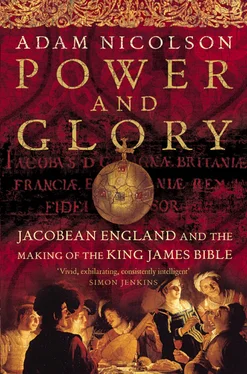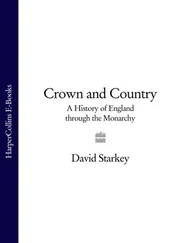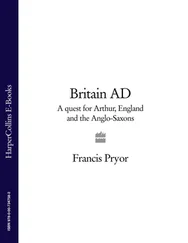The country felt younger and more vital than its queen. Cultural conservatives might have bemoaned the death of old values and the corruption of modern morals (largely from Italy, conceived of as a louche and violent place), but these were not the symptoms of decline. England was full of newness and potential: its population burgeoning, its merchant fleets combing the world, London growing like a hothouse plum, the sons of gentlemen crowding as never before into the colleges of Oxford and Cambridge, plants and fruits from all over the world arriving in its gardens and on its tables â but the rigid carapace of the Elizabethan court lay like a cast-iron lid above it. The queenâs motto was still what it always had been: Semper eadem , Always the same. She hadnât moved with the times. So parsimonious had she been in elevating men to the peerage that by the end of her reign there were no more than sixty peers in the nobility of England. Scarcely a gentleman had been knighted by the queen for years.
That drought of honours was a symptom of a kind of paralysis, an indecisive rigidity. None of the great issues of the country had been resolved. Inflation had transformed the economy but the Crown was still drawing rents from its properties that had been set in the 1560s. The relationship between the House of Commons and the queen, for all her wooing and flattery, had become angry, tetchy, full of recrimination. The old war against Spain, which had achieved its great triumph of defeating the Armada in 1588, had dragged on for decades, haemorrhaging money and enjoying little support from the Englishmen whose taxes were paying for it. The London and Bristol merchants wanted only one outcome: an end to war, so that trade could be resumed. Religious differences had been buried by the Elizabethan regime: both Roman Catholics, who wanted England to return to the fold of the Roman Church, and the more extreme, âhotterâ Protestants, the Puritans, who felt that the Reformation in England had never been properly achieved, had been persecuted by the queen and her church, fined, imprisoned and executed. Any questions of change, tolerance or acceptance had not been addressed. Elizabeth had survived by ignoring problems or suppressing them and as a result England was a cauldron which had not been allowed to boil. Later history â even in the seventeenth century itself â portrayed Elizabethâs death as a dimming of the brilliance, the moment at which England swopped a heroic, gallant, Renaissance freshness for something more degenerate, less clean-cut, less noble, more self-serving, less dignified. But that is almost precisely the opposite of what England felt at the time. Elizabeth was passé, decayed. A new king, with wife, children (Anne was pregnant with their sixth child) an heir for goodnessâ sake, a passionate huntsman, full of vigour, a poet, an intellectual of European standing, a new king, a new reign and a new way of looking at the world; of course the country longed for that. Elizabethâs death held out the prospect of peace with Spain, a new openness to religious toleration, and a resolution of the differences between the established church and both Catholics and Puritans. More than we can perhaps realise now, a change of monarch in an age of personal rule meant not only a change of government and policy, but a change of culture, attitude and belief. A new king meant a new world.
James Stuart was an unlikely hero: ugly, restless, red-haired, pale-skinned, his tongue, it was said, too big for his mouth, impatient, vulgar, clever, nervous. But his virtues, learned in the brutal world of Scottish politics, were equal to the slurs of his contemporaries. More than anything else he wanted and believed in the possibilities of an encompassing peace. He adopted as his motto the words from the Sermon on the Mount, Beati Pacifici , Blessed are the Peacemakers, a phrase which, in the aftermath of a European century in which the continent had torn itself apart in religious war, would appear over and over again on Jacobean chimneypieces and carved into oak testers and overmantels, crammed in alongside the dreamed of, wish-fulfilment figures of Peace and Plenty, Ceres with her overbrimming harvests and luscious breasts, Pax embracing Concordia. The Bible that is named after James, and whose translation was authorised by him, was central to his claim on that ideal.
James was in bed, but not yet asleep, when he learned that he had become King of England. He had been King of Scotland since he was one year old, when his mother Mary, Queen of Scots had been deposed thirty-five years before. He had spent his life in the wings and now, at last, his great scene was about to begin. A rather handsome and deeply indebted English gentleman, Sir Robert Carey, who at different times had been a commander against the Spanish Armada and a court dandy â just the sort of glamorous and rather sexy man to whom James was instinctively drawn â had ridden night and day on his own behalf to bring the news of Elizabethâs death to Scotland. For decades, Carey had been living beyond his means and was desperate for advancement. This was his main chance too. Having fallen off his horse and been kicked in the face en route, he finally reached the palace of Holyroodhouse in Edinburgh on the evening of 26 March 1603, some seventy hours after Queen Elizabeth had died in her palace at Richmond on the Thames. His head was bleeding from his fall.
Several weeks before, as Elizabeth had entered what was clearly her terminal illness, long, moping, energyless silences absorbing her, Carey had arranged for a string of horses to be waiting at inns all along the Great North Road and now he was well ahead of the game. Not until the following day were the proclamations made in Shrewsbury or York, and in Bristol only the day after that. But the English Privy Council already had their own spies in place at the Scottish court, and were curious to know how James had taken the news. âEven, my Lords,â their reporter, Sir Roger Aston, told them later that week, âlike a poore man wandering about 40 years in a wildernesse and barren soyle, and now arrived at the Land of Promise .â
It was the most perfect moment of Jamesâs life. He received Carey in his bedroom. The Englishman knelt before the king and âsaluted him by his title of England, Scotland, France and Ireland . Hee gave me his hand to kisse, and bade me welcome.â James wanted to know what letters Carey brought with him from the English Council, but Carey had to confess he had none. This was private enterprise, against the wishes of the English Secretary of State, Robert Cecil, and the only sign that Carey had brought from the south was a sapphire ring, which James had once sent to Careyâs sister, Philadelphia, Lady Scroope, with the express purpose that she would return it as soon as she knew that Elizabeth had died.
It was enough. James had come into his own. He rewarded Carey with a place as one of the Grooms of the Bedchamber. Or so he promised; within a few weeks Carey was squeezed out of the position, probably by Cecil, who objected to the vulgarity of Careyâs dash north, perhaps by jealous and ambitious Scots. For them, as much as for James, the kingdom of England, increasingly rich, populous, powerful, well governed and civilised, lay to the south glittering like a jewel, or at least a money pump, a promise of riches after years of making do.
The Scottish crown was one of the weakest in Europe. It had no money and could command no armed strength of its own. England, France and Spain wooed and threatened it in turn. The Scottish magnates plotted and brawled with each other. The culture was murderous and James had no natural allies. The Presbyterian Church, taking its cue from the words of the Apostle Peter (âWe ought to obey God rather than menâ) and of Calvin (âEarthly princes deprive themselves of all authority when they rise up against God ⦠We ought rather to spit in their faces than to obey themâ) considered the king and the monarchy inferior both to the word of God and to those who preached it. In 1596, the firebrand Presbyterian Andrew Melville had told James exactly where he stood: âI mon tell yow, thair is twa Kings and twa Kingdomes in Scotland. Thair is Chryst Jesus the King, and his Kingdome the Kirk, whase subject King James the Saxt is, and of whase kingdome nocht a king nor a lord nor a heid, bot a member.â
Читать дальше












